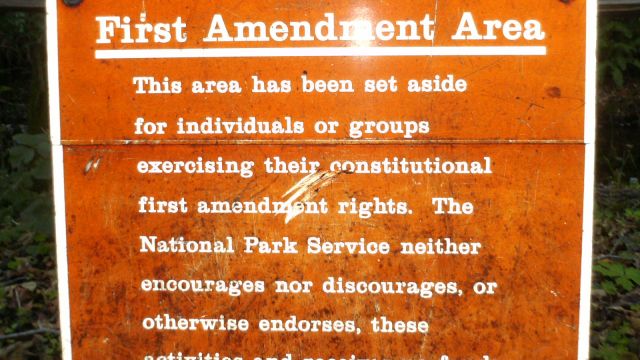Should We Debate the Genocidal Pastor?

On Mother’s Day, in a sermon to his flock at the Providence Road Baptist Church in North Carolina, Pastor Charles Worley revealed his plan to rid America of its homosexuals:
Build a great, big, large fence — 150 or 100 mile long — put all the lesbians in there….Do the same thing for the queers and the homosexuals and have that fence electrified so they can’t get out…and you know what, in a few years, they’ll die out…do you know why? They can’t reproduce!
Shock and outrage have been the main responses to Worley’s tirade, a recording of which has gone viral on YouTube. John Shore colorfully condemns Worley as “a morally repugnant, astoundingly ignorant, semi-literate, hate-filled meathead who wouldn’t know Jesus Christ from Cujo.” But what would happen if we resisted the urge to reflexively berate the man? What if we took the time to consider his ideas and respond to them? For better or worse, this is what John Stuart Mill, the great 19th-century utilitarian theorist of liberty pictured above, would have us do. In his absolutist defense of “liberty of thought and of discussion,” Mill argued that no view should be considered beyond the pale:
If all mankind minus one, were of one opinion, and only one person were of the contrary opinion, mankind would be no more justified in silencing that one person, than he, if he had the power, would be justified in silencing mankind.
Worley is not alone in his views. In recent weeks, other preachers have put forward similarly violent arguments against homosexuality. And while tolerance has spread enough to permit President Obama to come out in favor of same-sex marriage, anti-gay bias among the general public has hardly disappeared. But even if Worley were the only soul on earth who believed that gays and lesbians should be ghettoized behind an electric fence, Mill would presumably support his right to speak. And Mill does not simply argue against silencing minority views: he claims we should pay attention to such ideas when they are aired. Mill would intellectually engage with Worley rather than dismiss him.
So try, for a moment, to watch this video with an open mind:
Were you able to remain objective? No? Are you thinking he’s a hateful, ridiculous, horrible man? Let’s posit that Worley is horribly wrong-headed. Huddling gays and lesbians behind an electric fence to kill them off is genocide. Genocide is bad. Mill would agree with us on that point, I would hope, but he would still see value in airing and discussing Worley’s sermon. Here is why:
However unwillingly a person who has a strong opinion may admit the possibility that his opinion may be false, he ought to be moved by the consideration that however true it may be, if it is not fully, frequently, and fearlessly discussed, it will be held as a dead dogma, not a living truth.
Lest we forget why gay and lesbian individuals are due equal concern and respect, Mill tells us, we need to confront ideas like Worley’s and point out why they are wrong. Listening to ideas anathema to our own can reinforce true beliefs and help us appreciate anew the original reasoning behind them. We need to “fully, frequently, and fearlessly” debate positions we hold dear. In that spirit, here are a few possible arguments to start our hypothetical debate with the pastor:
Here is another, Bible-based approach to refuting Worley’s words from blogger Eugene Cho:
[W]hile I certainly do not know Pastor Charles L. Worley – I feel that it’s necessary for me to publicly state that in no shape, form, or another does he speak for Christians, the church, Christian leaders, or Christian pastors – including those who have convictions and views that marriage is between one man and one woman. I condemn his words and his behavior. I denounce this kind of hatred, venom, and anger. If hate is your motivation, you are far from God and you need to repent. May our love for doctrine and theology never supersede our practice of the love and grace of Christ and neighbor.
Whatever argumentative strategy you employ, Mill would say, argue you must. Spewing ad hominem attacks, turning the other cheek, or simply getting huffy are no-nos.
But it’s entirely possible that Mill’s suggestion is wrong, as it applies to this case or in general. (We wouldn’t want to swallow Mill’s idea as a dead dogma, right?) Maybe there are some ideas that are beyond the pale. Maybe there are some views that do not merit a rational response, and dignifying them with an answer introduces a question and attracts an audience where there should be no legitimate dispute. Maybe dialogue with someone as hateful as Rev. Worley is a ridiculous proposition, if not a losing one. Maybe throwing invective back at the guy is the better tack.
What do you think: should we listen to Pastor Worley and respond to him with careful reasoning about the errors of his thinking? Or should we condemn him as a genocidal bigot and move on? If you’re tempted toward the latter position: where would you propose drawing the line between ideas that deserve rational responses and those we can merely mock?
Follow Steven Mazie on Twitter: @stevenmazie





